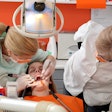
Differing state laws, regulations, and scopes of practices have worsened the ongoing shortage of dental assistants, readying dentistry for the development of a U.S. model framework to change the dynamics, according to a report from the Dental Assisting National Board (DANB).
About 8 in 10 dentists and dental assistants reported supporting states adopting similar regulations for dental assistants so there would be greater uniformity in the requirements in the U.S. Of the 83% who support this, 46% wholeheartedly support the change and 37% support the idea with reservations, according to DANB's "Perspectives on Dental Assisting Professional Requirements."
Dental practices continue to deal with reduced capacity, efficiency, and productivity due to the ongoing shortage of qualified dental assistants. Varying laws and other factors in each state have contributed to decreased workforce mobility and insufficient numbers of qualified dental assistants.
DANB stated that the Dental Assisting Professional Model Workgroup, which includes about 20 dental assistants, dentists, educators, dental hygienists, and regulators that was created to address inconsistency in dental assisting requirements and scope of practice from state to state, will use the results to inform its work in developing a proposed framework for the dental assisting profession.
"The ideal framework will not only address existing barriers and discrepancies, but also lay the groundwork for a more unified, dynamic, and empowered dental assisting profession across the nation," according to the report.
In October 2023, a survey was sent to dentists and dental assistants regarding these issues. The survey had more than 1,100 responses throughout the U.S. More than 500 were from dentists and more than 600 were from dental assistants, according to the report.
When asked about staff shortages, 72% of dentists reported that it was very difficult or difficult hiring dental assistants. Additionally, about 70% of dentists reported the biggest challenge to hiring dental assistants is a lack of applicants and 64% reported a lack of qualified applicants, according to the results.
Furthermore, the report revealed that current laws and regulations needed improvements. Only 10% of dentists and dental assistants reported that their state's current laws and regulations were excellent, while about 75% said they were satisfactory or average.
Also, dentists and dental assistants recognized that their states' current laws and regulations failed to create opportunities for career growth for dental assistants, with 47% citing this as an issue, according to the report.




















